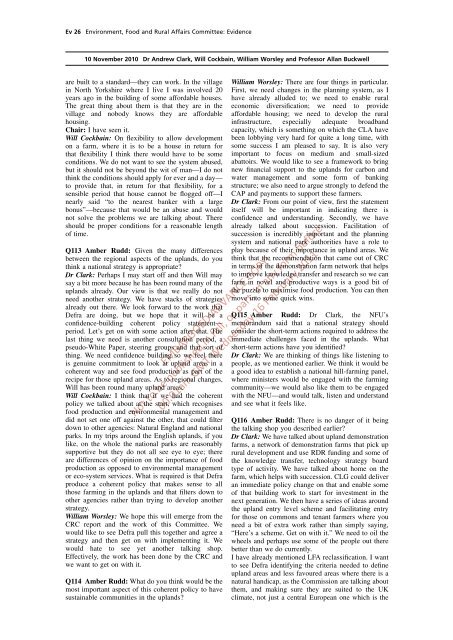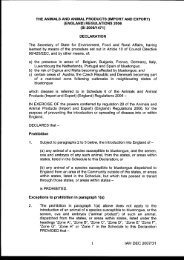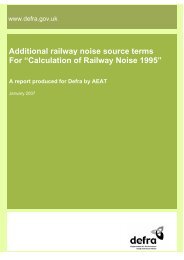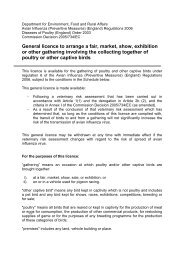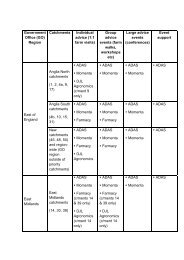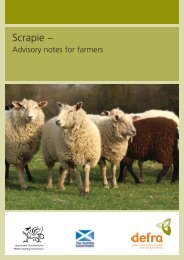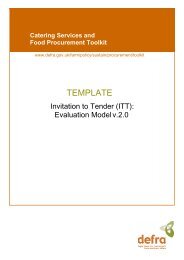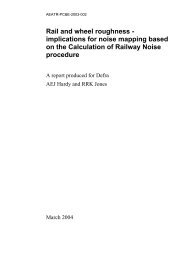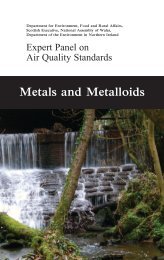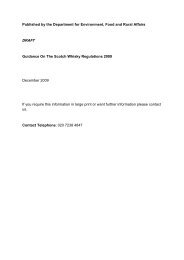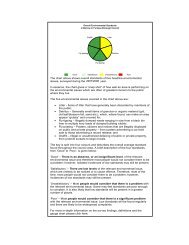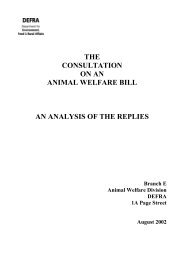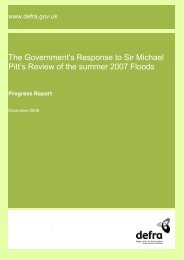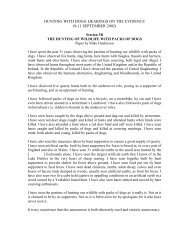Farming in the Uplands - ARCHIVE: Defra
Farming in the Uplands - ARCHIVE: Defra
Farming in the Uplands - ARCHIVE: Defra
Create successful ePaper yourself
Turn your PDF publications into a flip-book with our unique Google optimized e-Paper software.
Ev 26 Environment, Food and Rural Affairs Committee: Evidence<br />
10 November 2010 Dr Andrew Clark, Will Cockba<strong>in</strong>, William Worsley and Professor Allan Buckwell<br />
are built to a standard—<strong>the</strong>y can work. In <strong>the</strong> village<br />
<strong>in</strong> North Yorkshire where I live I was <strong>in</strong>volved 20<br />
years ago <strong>in</strong> <strong>the</strong> build<strong>in</strong>g of some affordable houses.<br />
The great th<strong>in</strong>g about <strong>the</strong>m is that <strong>the</strong>y are <strong>in</strong> <strong>the</strong><br />
village and nobody knows <strong>the</strong>y are affordable<br />
hous<strong>in</strong>g.<br />
Chair: I have seen it.<br />
Will Cockba<strong>in</strong>: On flexibility to allow development<br />
on a farm, where it is to be a house <strong>in</strong> return for<br />
that flexibility I th<strong>in</strong>k <strong>the</strong>re would have to be some<br />
conditions. We do not want to see <strong>the</strong> system abused,<br />
but it should not be beyond <strong>the</strong> wit of man—I do not<br />
th<strong>in</strong>k <strong>the</strong> conditions should apply for ever and a day—<br />
to provide that, <strong>in</strong> return for that flexibility, for a<br />
sensible period that house cannot be flogged off—I<br />
nearly said “to <strong>the</strong> nearest banker with a large<br />
bonus”—because that would be an abuse and would<br />
not solve <strong>the</strong> problems we are talk<strong>in</strong>g about. There<br />
should be proper conditions for a reasonable length<br />
of time.<br />
Q113 Amber Rudd: Given <strong>the</strong> many differences<br />
between <strong>the</strong> regional aspects of <strong>the</strong> uplands, do you<br />
th<strong>in</strong>k a national strategy is appropriate?<br />
Dr Clark: Perhaps I may start off and <strong>the</strong>n Will may<br />
say a bit more because he has been round many of <strong>the</strong><br />
uplands already. Our view is that we really do not<br />
need ano<strong>the</strong>r strategy. We have stacks of strategies<br />
already out <strong>the</strong>re. We look forward to <strong>the</strong> work that<br />
<strong>Defra</strong> are do<strong>in</strong>g, but we hope that it will be a<br />
confidence-build<strong>in</strong>g coherent policy statement—<br />
period. Let’s get on with some action after that. The<br />
last th<strong>in</strong>g we need is ano<strong>the</strong>r consultation period, a<br />
pseudo-White Paper, steer<strong>in</strong>g groups and that sort of<br />
th<strong>in</strong>g. We need confidence build<strong>in</strong>g so we feel <strong>the</strong>re<br />
is genu<strong>in</strong>e commitment to look at upland areas <strong>in</strong> a<br />
coherent way and see food production as part of <strong>the</strong><br />
recipe for those upland areas. As to regional changes,<br />
Will has been round many upland areas.<br />
Will Cockba<strong>in</strong>: I th<strong>in</strong>k that if we had <strong>the</strong> coherent<br />
policy we talked about at <strong>the</strong> start, which recognises<br />
food production and environmental management and<br />
did not set one off aga<strong>in</strong>st <strong>the</strong> o<strong>the</strong>r, that could filter<br />
down to o<strong>the</strong>r agencies: Natural England and national<br />
parks. In my trips around <strong>the</strong> English uplands, if you<br />
like, on <strong>the</strong> whole <strong>the</strong> national parks are reasonably<br />
supportive but <strong>the</strong>y do not all see eye to eye; <strong>the</strong>re<br />
are differences of op<strong>in</strong>ion on <strong>the</strong> importance of food<br />
production as opposed to environmental management<br />
or eco-system services. What is required is that <strong>Defra</strong><br />
produce a coherent policy that makes sense to all<br />
those farm<strong>in</strong>g <strong>in</strong> <strong>the</strong> uplands and that filters down to<br />
o<strong>the</strong>r agencies ra<strong>the</strong>r than try<strong>in</strong>g to develop ano<strong>the</strong>r<br />
strategy.<br />
William Worsley: We hope this will emerge from <strong>the</strong><br />
CRC report and <strong>the</strong> work of this Committee. We<br />
would like to see <strong>Defra</strong> pull this toge<strong>the</strong>r and agree a<br />
strategy and <strong>the</strong>n get on with implement<strong>in</strong>g it. We<br />
would hate to see yet ano<strong>the</strong>r talk<strong>in</strong>g shop.<br />
Effectively, <strong>the</strong> work has been done by <strong>the</strong> CRC and<br />
we want to get on with it.<br />
Q114 Amber Rudd: What do you th<strong>in</strong>k would be <strong>the</strong><br />
most important aspect of this coherent policy to have<br />
susta<strong>in</strong>able communities <strong>in</strong> <strong>the</strong> uplands?<br />
William Worsley: There are four th<strong>in</strong>gs <strong>in</strong> particular.<br />
First, we need changes <strong>in</strong> <strong>the</strong> plann<strong>in</strong>g system, as I<br />
have already alluded to; we need to enable rural<br />
economic diversification; we need to provide<br />
affordable hous<strong>in</strong>g; we need to develop <strong>the</strong> rural<br />
<strong>in</strong>frastructure, especially adequate broadband<br />
capacity, which is someth<strong>in</strong>g on which <strong>the</strong> CLA have<br />
been lobby<strong>in</strong>g very hard for quite a long time, with<br />
some success I am pleased to say. It is also very<br />
important to focus on medium and small-sized<br />
abattoirs. We would like to see a framework to br<strong>in</strong>g<br />
new f<strong>in</strong>ancial support to <strong>the</strong> uplands for carbon and<br />
water management and some form of bank<strong>in</strong>g<br />
structure; we also need to argue strongly to defend <strong>the</strong><br />
CAP and payments to support <strong>the</strong>se farmers.<br />
Dr Clark: From our po<strong>in</strong>t of view, first <strong>the</strong> statement<br />
itself will be important <strong>in</strong> <strong>in</strong>dicat<strong>in</strong>g <strong>the</strong>re is<br />
confidence and understand<strong>in</strong>g. Secondly, we have<br />
already talked about succession. Facilitation of<br />
succession is <strong>in</strong>credibly important and <strong>the</strong> plann<strong>in</strong>g<br />
system and national park authorities have a role to<br />
play because of <strong>the</strong>ir importance <strong>in</strong> upland areas. We<br />
th<strong>in</strong>k that <strong>the</strong> recommendation that came out of CRC<br />
<strong>in</strong> terms of <strong>the</strong> demonstration farm network that helps<br />
to improve knowledge transfer and research so we can<br />
farm <strong>in</strong> novel and productive ways is a good bit of<br />
<strong>the</strong> puzzle to maximise food production. You can <strong>the</strong>n<br />
move <strong>in</strong>to some quick w<strong>in</strong>s.<br />
Q115 Amber Rudd: Dr Clark, <strong>the</strong> NFU’s<br />
memorandum said that a national strategy should<br />
consider <strong>the</strong> short-term actions required to address <strong>the</strong><br />
immediate challenges faced <strong>in</strong> <strong>the</strong> uplands. What<br />
short-term actions have you identified?<br />
Dr Clark: We are th<strong>in</strong>k<strong>in</strong>g of th<strong>in</strong>gs like listen<strong>in</strong>g to<br />
people, as we mentioned earlier. We th<strong>in</strong>k it would be<br />
a good idea to establish a national hill-farm<strong>in</strong>g panel,<br />
where m<strong>in</strong>isters would be engaged with <strong>the</strong> farm<strong>in</strong>g<br />
community—we would also like <strong>the</strong>m to be engaged<br />
with <strong>the</strong> NFU—and would talk, listen and understand<br />
and see what it feels like.<br />
EMBARGOED ADVANCE COPY:<br />
Not to be published <strong>in</strong> full, or part, <strong>in</strong> any form before<br />
00.01am GMT Wednesday 16 February 2011<br />
Q116 Amber Rudd: There is no danger of it be<strong>in</strong>g<br />
<strong>the</strong> talk<strong>in</strong>g shop you described earlier?<br />
Dr Clark: We have talked about upland demonstration<br />
farms, a network of demonstration farms that pick up<br />
rural development and use RDR fund<strong>in</strong>g and some of<br />
<strong>the</strong> knowledge transfer, technology strategy board<br />
type of activity. We have talked about home on <strong>the</strong><br />
farm, which helps with succession. CLG could deliver<br />
an immediate policy change on that and enable some<br />
of that build<strong>in</strong>g work to start for <strong>in</strong>vestment <strong>in</strong> <strong>the</strong><br />
next generation. We <strong>the</strong>n have a series of ideas around<br />
<strong>the</strong> upland entry level scheme and facilitat<strong>in</strong>g entry<br />
for those on commons and tenant farmers where you<br />
need a bit of extra work ra<strong>the</strong>r than simply say<strong>in</strong>g,<br />
“Here’s a scheme. Get on with it.” We need to oil <strong>the</strong><br />
wheels and perhaps use some of <strong>the</strong> people out <strong>the</strong>re<br />
better than we do currently.<br />
I have already mentioned LFA reclassification. I want<br />
to see <strong>Defra</strong> identify<strong>in</strong>g <strong>the</strong> criteria needed to def<strong>in</strong>e<br />
upland areas and less favoured areas where <strong>the</strong>re is a<br />
natural handicap, as <strong>the</strong> Commission are talk<strong>in</strong>g about<br />
<strong>the</strong>m, and mak<strong>in</strong>g sure <strong>the</strong>y are suited to <strong>the</strong> UK<br />
climate, not just a central European one which is <strong>the</strong>


